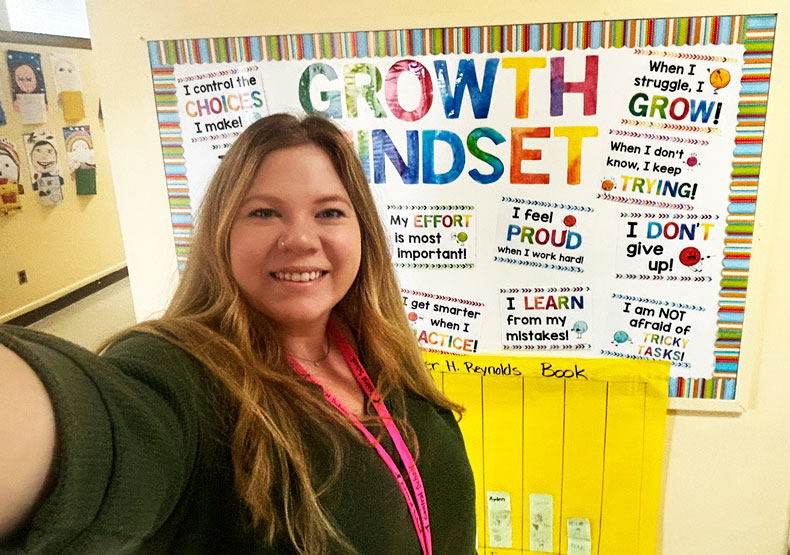Paying it Forward Via Public Education: How One Massachusetts Native Plans to Give Back

Sarah Bennett, Student in the MA/CAGS in School Psychology
Sarah Bennett is a firm believer in public education. The life-long resident of Massachusetts graduated from Plymouth South High School and earned her BA in psychology from UMass Dartmouth, where her interest in psychology was piqued early on. As an undergrad with a joint passion for cognitive/social-emotional testing and one-on-one therapy, she saw two clear pathways for working with school-aged students in her field: as a school-based guidance counselor or a private-practice clinical psychologist. She credits her mentor, a psychologist in private practice doing contract work in the local public schools, as pointing her toward a third option — a career in school psychology.
“School psychology is a great way to reach a large number of students who might not otherwise have access to resources,” said Bennett, underscoring what she likes most about the field: Identifying students experiencing academic, emotional or behavioral issues—via interviews with parents or teachers, using a variety of evidence-based assessment measures, and providing interventions for the student, teachers, and parents to help the student succeed in the classroom and in the community. Bennett first realized she wanted to work with underserved populations during an experience working as a residential counselor at a group home for individuals with disabilities. There, candid conversations with transitional-aged youth helped further cultivate her career path.
“I had so many conversations with young adults, just out of [high] school, who—while facing serious mental health concerns and crises—had no emotional support,” she recalls, underscoring a problem: Time and again, these young adults consistently reported being unaware of the resources available to them in their learning environments, a fact that made Bennett realize the number of students, “with massive needs for support, flying under the radar” due to a dearth of practitioners — a fact that ultimately led Bennett to William James College while researching graduate programs in the Boston-metro region.
“William James was my first pick, right off the bat, due to the immersive field experiences they provide students from the beginning of the program to the end,” said Bennett, a hands-on learner, who enjoys working with the special education population to identify the unique and specific needs of each student required to access the curriculum.
Two years ago, Bennett completed her first-year practicum at East Bridgewater Public Schools, a district in which 17.4% of students have an Individualized Education Plan (IEP) and more than 26% of the student population receives free or reduced lunch according to 2020-21 data; this year, she returned to the District for her final culminating Internship: a full year of supervised field experience with a licensed school psychologist.
“Seeing more families from diverse backgrounds join the community, and watching how the schools adapt not only to meet their needs but also to make them feel welcome and supported, is what has really helped me frame my mindset and inspire my future career,” said Bennett. The third-year student in the School Psychology MA/CAGS program looks forward to fostering students’ growth via inclusiveness of all cultures, religions, and traditions, conversations that hinge on diversity, and communication between home and school that not only facilitates transitions but also forms a supportive environment in which all students have access to the full spectrum of resources needed to thrive.
For her final academic year, Bennett was awarded a scholarship from the Mental Health Services Professional (MHSP) Demonstration Grant Program, made possible by a $5.9 million dollar grant from the U.S. Department of Education aimed at supporting the growth and expansion of a diverse behavioral health workforce to deliver care to children and adolescents in high-need school districts across Massachusetts.
“Ending the program on this note has been a huge help, one that’s allowed me to increase my focus, work extra hard on completing my assignments, and cultivate a positive rapport with my students,” said Bennett who—as a direct result of this funding—has been afforded the time to strengthen her own cultural competence via seminars, as a means of supporting diverse populations, in lieu of working multiple side jobs to make ends meet.
Of the many reasons Bennett is drawn to school psychology, positioning herself to benefit public-school students remains at the top of the list. “I love being that first piece of the puzzle that is figuring out [a student’s] needs,” said Bennett whose strong clinical skills, knowledge of evidence-based and inclusive practices, and interest in supporting underrepresented and underserved populations made her an ideal candidate for the scholarship.
“Going forward, I plan on using my training not only to advocate for students with special needs, but also to encourage systemic change so that all students have access to the educational and mental-health resources needed to thrive in school and beyond.”
- Tags:
- School Psychology
- Profile
Topics/Tags
Follow William James College
Media Contact
- Katie O'Hare
- Senior Director of Marketing
- katie_ohare@williamjames.edu
- 617-564-9389
